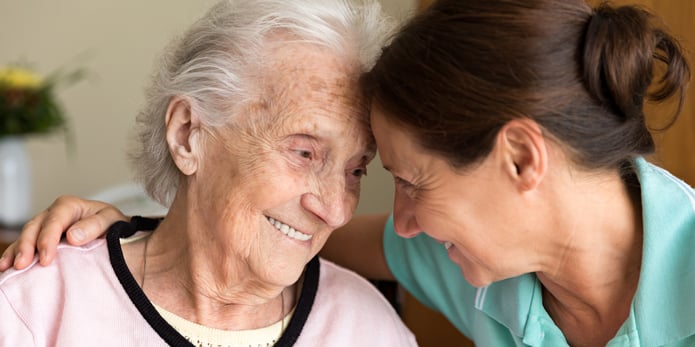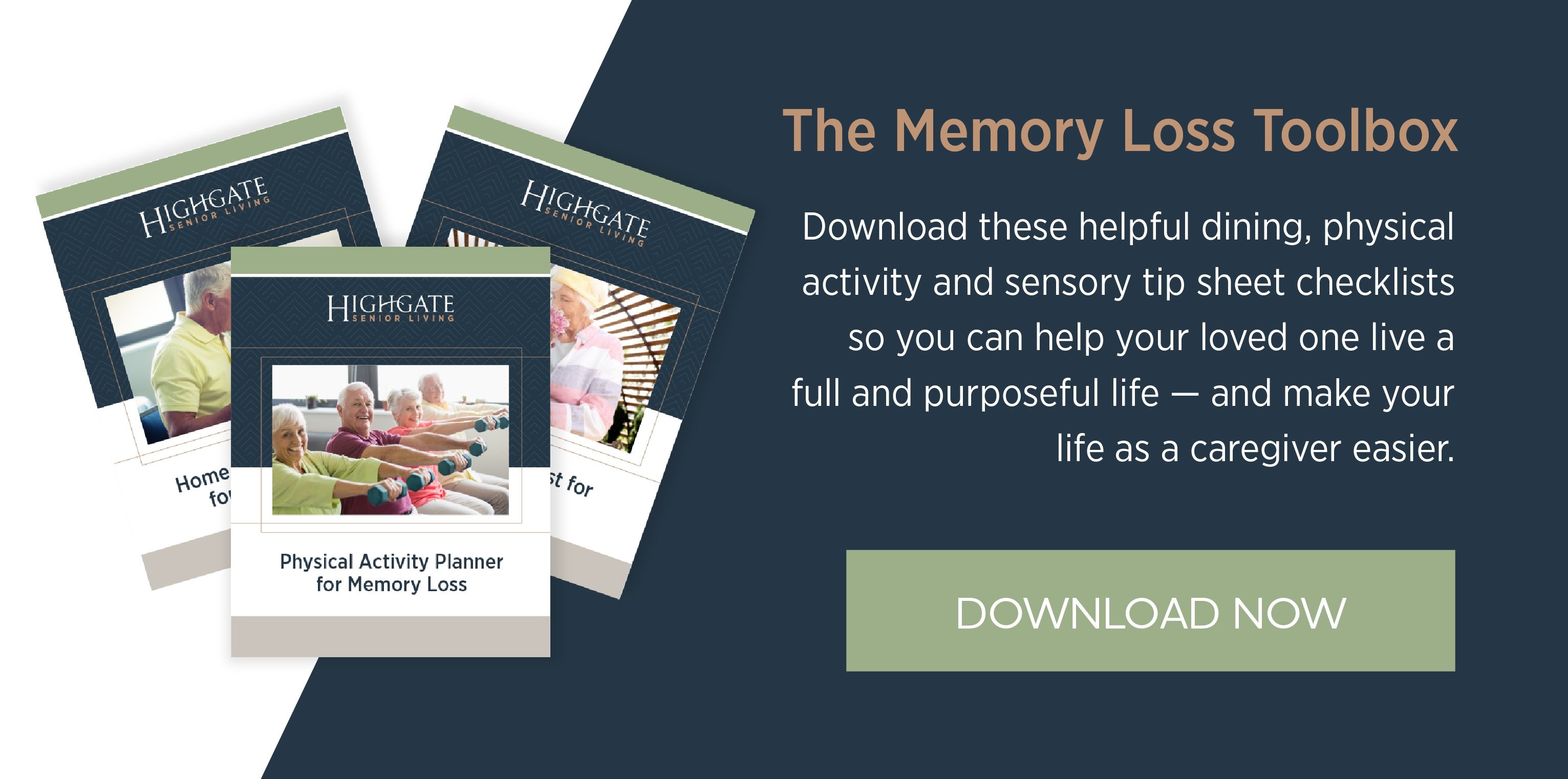
Practicing gratitude is a great way to reduce stress when caregiving. Studies show that intentionally practicing gratitude can improve mood, lower stress, ward off depression, help you sleep better, and improve your relationship with your loved one or other close family and friends who may be seeing the impact caregiving for someone with memory loss can have.
The Emotional Toll of Dementia Caregiving
Being grateful and expressing gratitude doesn’t mean you have to ignore the not-so-good feelings that are perfectly normal to experience when caregiving becomes frustrating. The change in behavior, attitude, or even willingness to complete simple tasks changes the way you relate to your loved one with dementia, so it’s normal to feel a wide range of emotions.
How normal? Have you ever felt frustrated at the forgetfulness or repetitive stories and questions? That’s normal. Have you ever felt angry as roles start to shift and you learn how to navigate parenting the parent? That’s normal. Have you felt guilty for getting impatient with your loved one’s increasingly uncharacteristic behaviors? That’s normal. Or, have you experienced immense sadness as you watch your loved one become someone entirely different? Well, that’s normal too. Both caregiver depression and perceived burden increase as the care receiver's functional status declines.
The Benefits of a Gratitude Attitude
It’s precisely because of all the stress that comes with dementia caregiving that caregivers need ways to relieve stress.
How effective is practicing gratitude on your overall health? According to psychologists, Dr. Robert A. Emmons of the University of California, Davis, and Dr. Michael E. McCullough of the University of Miami, very effective. In one study, they asked all participants to write a few sentences each week, focusing on particular topics. One group wrote about things they were grateful for that had occurred during the week. A second group wrote about daily irritations or things that had displeased them, and the third wrote about events that had affected them (with no emphasis on them being positive or negative). After 10 weeks, those who wrote about gratitude were more optimistic and felt better about their lives. Surprisingly, they also exercised more and had fewer visits to physicians than those who focused on sources of aggravation.
How does gratitude positively impact your relationship with your loved one or others close to you? Author Robert Emmons writes, “Gratitude is a social emotion. I see it as a relationship-strengthening emotion because it requires us to see how we’ve been supported and affirmed by other people.”
Practicing a Positive Approach to Care
Gratitude can also help you be a better caregiver. Leading Alzheimer’s and dementia expert, Teepa Snow, encourages dementia caregivers to focus not on what’s lost but on what’s left and to concentrate on what can be done rather than what can’t. Known as the Positive Approach to Care, this philosophy can help you find understanding and a positive perspective when caregiving.
For example, people with memory loss often come to live in an altered reality. Memories can become garbled and create delusions that don’t make any sense to you. But they are real to your loved one. So if your loved one doesn’t recognize you anymore, try to step into their world. They might not know your name — and that can indeed be painful — but perhaps you can still sit together and hold hands while watching the birds outside or looking at old photographs. Your loved one is still “in there,” and even if they don’t remember your name, you’re still able to connect on an emotional level.
Ultimately, a Positive Approach to Care allows you to celebrate the present, which is one of the main reasons why gratitude is good for your mind, body, and spirit.
5 Ways to Practice Gratitude
If you are looking for ways to strengthen your gratitude skills, take a look at these five ways you can practice gratitude while caring for a loved one with memory loss.
1. Keep a Gratitude Journal
Get in a habit of writing down things that you’re grateful for. It can be as simple as a list of five things. But to really reap the rewards, consciously and intentionally focus on the gifts in your life that you’d otherwise take for granted. You don’t even have to do it every day. In fact, once or twice a week can be more beneficial.
Here are some prompts to help you get started:
- Did something make you smile or laugh today?
- Did you have a nice conversation with a friend or loved one?
- Did a memory of happy times pop into your mind today?
- Is the view from your window something you enjoy?
- Do you have a pet that is always happy to see you?
- Did you find a few minutes during the day to exercise?
2. Tune into Straight Up Positive
Finding the silver lining can be hard when you’re alone, and in the midst of a global pandemic, many caregivers are finding themselves more isolated than ever before.
To bring people together to share positive stories, Teepa Snow launched a live weekly Facebook event called Straight Up Positive. Every Tuesday at 7 p.m. ET, a team of Positive Approach to Care mentors highlight the positive and inspiring things that the greater community is doing. Join in on the show as it is happening live and submit comments into the chat, or watch the video after the session is done.
3. Create a Gratitude Jar
To extend the practice of gratitude to those you live with, create a gratitude jar or bowl. At the end of the day, have everyone in your household write down something they’re grateful for and put it in the jar or bowl. Read a few of the slips out loud each day when you’re together at mealtime or post a gratitude note on the refrigerator. It can be helpful to have a concrete reminder to practice gratitude.
4. Write a Thank-You Note
Don’t keep your gratitude to yourself. Sending a thank-you note expressing your enjoyment and appreciation of a person’s impact on your life can not only make you happier. It can also improve the well-being of the recipient.
Keep cards on hand so you can compose a note whenever the mood strikes, and deliver and read it in person if possible.
5. Focus Your Actions
Caregivers often take on too much, and eventually, the stress leads to burnout. The Family Caregiving Alliance offers a few simple exercises caregivers can do to focus their actions, especially during the holidays. Use these exercises to help identify who receives the gift of your time, activities that make you smile and feel content, and feelings that you want to cultivate to feel more often.
For more tips and resources to help you navigate the changes you and your loved one will encounter as memory loss progresses, check out our Memory Loss Toolbox. You’ll find checklists, planners, and tip sheets to help you improve the physical health of your loved one, make mealtime a positive and enjoyable experience, and calm and soothe before turning to medication.






